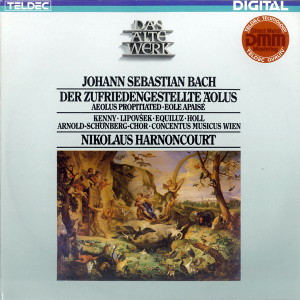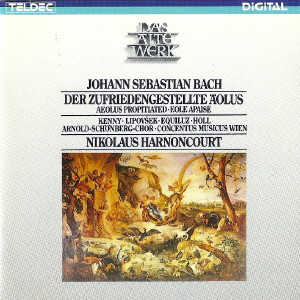 |
1 LP -
6.42915 AZ - (p) 1983
|

|
| 1 CD -
8.42915 ZK - (p) 1983 |
|
Johann Sebastian
Bach (1685-1750)
|
|
|
|
|
|
|
|
"Der
zufriedengestellte Äolus" - Dramma per
Musica
|
|
|
|
|
|
|
|
| Kantate "Zerreißet,
zersprenget, zertrümmert die Gruft",
BWV 205 |
|
|
|
| - Chor der Winde "Zerreißet,
zersprenget, zertrümmert die Gruft" |
6' 25" |
|
A1 |
| - Recitativo (Äolus) "Ja!
ja! die Stunden sind nunmehro nah" |
1' 35" |
|
A2 |
| - Aria (Äolus) "Wie will
ich lustig lachen" |
4' 13" |
|
A3 |
| - Recitativo (Zephyrus) "Gefürcht'ter
Äolus" |
0' 37" |
|
A4 |
| - Aria (Zephyrus) "Frische
Schatten, meine Freude" |
4' 40" |
|
A5 |
| - Recitativo (Äolus) "Beinahe
wirst du mich bewegen" |
0' 35" |
|
A6 |
| - Aria (Pomona) "Können
nicht die roten Wangen" |
3' 11" |
|
A7 |
| - Recitativo (Pallas,
Pomona) "So willst du, grimm'ger
Äolus" |
0' 46" |
|
B1 |
- Aria (Pallas) "Angenehmer
Zephyrus"
|
3' 50" |
|
B2 |
| - Recitativo (Pallas, Äolus)
"Mein Äolus, ach! störe nicht die
Fröhlichkeiten" |
2' 18" |
|
B3 |
| - Aria (Äolus) "Zurücke,
zurücke, geflügelten Winde" |
3' 21" |
|
B4 |
| - Recitativo (Pallas,
Pomona, Zephyrus) "Was Lust! Was
Freude! Welch Vergnügen!" |
1' 36" |
|
B5 |
| - Aria (Pomona, Zephyrus) "Zweig
und Äste zollen dir" |
3' 20" |
|
B6 |
| - Recitativo (Pallas) "Ja,
ja! ich lad euch selbst zu dieser Feier
ein" |
0' 40" |
|
B7 |
| - Chorus "Vivat! August,
August vivat" |
2' 55" |
|
B8 |
|
|
|
|
Yvonne Kenny, Pallas
|
|
Marjana Lipovsék, Pomona
|
|
Kurt Equiluz, Zephyrus
|
|
Robert Holl,
Äolus
|
|
|
|
Arnold-Schönberg-Chor, Wien /
Erwin G. Ortner, Leitung
|
|
|
|
CONCENTUS MUSICUS WIEN (mit
Originalinstrumenten)
|
|
-
Thomas Zehetmair, Violine
|
-
Friedemann Immer, Naturtrompete in
D |
|
| -
Alice Harnoncourt, Violine, Viola
d'amore |
-
Richard Rudolf, Naturtrompete in
D |
|
| -
Peter Schoberwalter, Violine |
-
Hermann Schober, Naturtrompete in
D |
|
| -
Karl Höffinger, Violine |
- Kurt Hammer, Pauken |
|
| -
Anita Mitterer, Violine |
-
Hermann Baumann, Corno (Naturhorn
in D) |
|
-
Andrea Bischof, Violine
|
-
Francesco Raselli, Corno (Naturhorn
in D) |
|
| -
Helmut Mitter, Violine |
- Leopold Stastny,
Flauto traverso |
|
| -
Wolfgang Trauner, Violine |
-
Gottfried Hechtl, Flauto traverso |
|
| -
Kurt Theiner, Viola |
-
Marie Wolf, Oboe |
|
| -
Josef de Sordi, Viola |
-
Jürg Schaeftlein, Oboe |
|
-
Christophe Coin, Violoncello
(7,12,13,14), Viola da gamba
|
|
|
| -
Rudolf Leopold, Violoncello
(1,2,3,9,10,11,15) |
|
|
-
Nikolaus Harnoncourt, Violoncello
|
|
|
| -
Milan Turkovic, Fagott |
|
|
| -
Eduard Hruza, Violone |
|
|
-
Herbert Tachezi, Orgel, Cembalo
|
|
|
|
|
| Nikolaus
Harnoncourt, Gesamtleitung |
|
|
|
Luogo e data
di registrazione
|
1982
|
|
Registrazione
live / studio
|
| studio |
Producer / Engineer
|
| - |
Prima Edizione
CD
|
Teldec "Das Alte Werk" -
8.42915 ZK - (1 cd) - 40' 55" - (p) 1983
- DDD
|
|
Prima
Edizione LP
|
Teldec "Das Alte Werk" -
6.42915 AZ - (1 lp) - 40' 55" - (p) 1983
- Digital
|
|
|
Introduction
|
Cantata
BWV 205, described by Bach
as a “Dramma per musica”,
i.e. virtually an opera, was
dedicated to August Müller,
a lecturer in botany at the
University of Leipzig, and
performed in August 1725 in
honour of his name-day.
Bach, who was on excellent
terms with the teaching
staff of the University,
produced a highly dramatic
work with distinctly
operatic details which made
the celebrated Dr. Müller
the butt ofa fraternal
joke
in the manner of a
large-scale student rag. One
gets the impression that the
good betanist may have been
given to outbursts of
temper, that he may have had
a slight speech defect and
that he was capable of
joining his friends and
students in laughing at his
own idiosyncrasies. In
the “Chorus of Winds” Bach’s
orchestra, employing a
unique range of instruments
for that period, describes
dramatically how the storm, imprisoned in
a cave, attempts to escape.
Scales rushing up and down
in scissor-like movement
depict “destroying”, drum
rolls and crashing brass
“breaking asunder” and
“shattering”. The captive
winds seem to trigger off a
veritable earthquake. - (The
phrasing of the orchestral
writing in this chorus and
indeed in all the
instrumental parts of the
cantata was filled
in according to the rules
then prevailing.)
A furious recitativo
accompagnato in operatic
style then depicts Aeolus as
a raging giant who delights
in destroying everything
from delicate flowers to
mighty cedars. - The
botanist`s carefully tended
garden is ruined. Aria No. 3
is a grandiose laugh of
derision.
Now three gentler characters
attempt, one after the
other, to restrain the
contemptuous giant: first
of all sweetly wafting
Zephyr, seemingly somewhat
intimidated by Aeolus’ aria
which ends on an abrupt
chord on the bass
instruments. In Aria No. 5,
accompanied by the gentlest
instruments then available
(using, in this recording,
an organ for
reasons of tonal symbolism)
he depicts the pleasures of
summer shades in the soft
breeze.
- Aeolus’ reaction is one of
slight irritation,
particularly as Pomona and
Pallas now also bring their
spellbinding charms to bear.
- Aeolus
does not reply to Pomona’s
entreaties, but the text of
the next recitative
indicates that he has turned
her down with a violent
gesture of refusal. - Pallas
is delighted at Pomona`s
snub ; the two ladies
compete for Aeolus’ favours
much like the three
goddesses for Paris. Pallas’
aria is accompanied by an
ingratiating violin with a
range extending far
beyond that usually found
in Bach’s
works. She pleads with
Aeolus to refrain
from
raging and to give gentle
Zephyr‘s
breezes pride of place
during the festivities, but
her request is also met by a
stern gesture of refusal.
Then she plays her trump
card, invoking August Müller
himself. His name is treated
with playful irony (Müller
was, alter all, the most
common surname of the day
and a large numher of Saxon
boys were christened August
because this was the most
popular name among the kings
of`Saxony.)
- Aeolus concedes defeat. In an
aria with unparalleled
scoring (using trumpets and
horns together and
dispensing with strings
altogether were both
unbelievably daring at that
time) the winds are driven
back. - The three victors
triumph in a trio recitative
and then address the object
of the festivities. Pomona`s
fruit and Zephyr’s lisping
breath, both of which
the botanist
already possesses,
are proffered to everyone‘s
joy and delight. - The final
chorus announced by the
exultant Pallas is a
Rondeau-Bourrée. scored as
though it were intended to
celebrate a royal accession.
The use of trumpets and
timpani was, after all, the
preserve of the spiritual
and secular authorities. The
orchestration and the text
("Vivat
August") may have been a
somewhat exaggerated panoply
for the little academic. The
disregard for
the ban on trumpets and the
occasion - since the king’s
name-day was celebrated
throughout the country on
the same day - may well have had
an ulterior motive.
Nikolaus
Harnoncourt
Translation:
Lindsay Craig
|
|
Nikolaus
Harnoncourt (1929-2016)
|

|

|
|